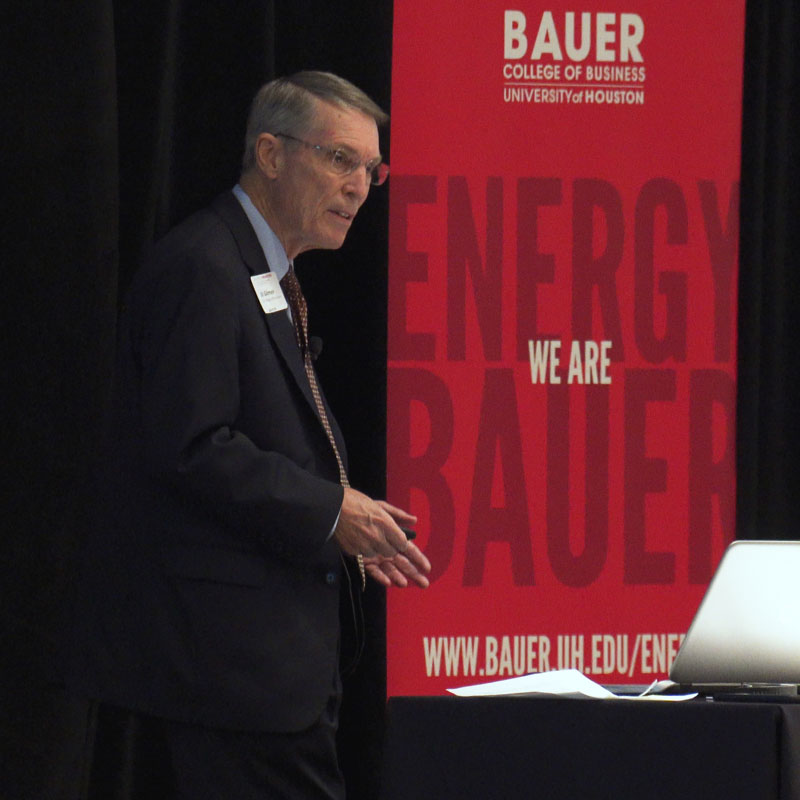Houston Endures Economic Slowing
Bauer College’s Institute for Regional Forecasting Provides Economic Outlook for Houston During Fall Symposium
Published on November 22, 2019

Recession is widely discussed today, both in the press and by the public. However, C. T. Bauer College of Business economist Bill Gilmer said that while both the United States and Houston economies are slowing, it is unlikely that a significant economic downturn for either the country or city is imminent.
Instead, the director of the Institute for Regional Forecasting told a crowd of 650 gathered for his twice-yearly regional forecast that the U.S. and Houston economy are enduring a moderate slow-down. Since the region’s economic health remains reliant on the national economy and the energy industry, which is currently struggling with $50 to $60 a barrel oil, a recession could happen. But it’s impossible to predict what might trigger a full-blown recession ― and when, he said.
“There’s always a recession somewhere on the horizon. The question is when it will be,” Gilmer said, noting that recessions are typically caused by oil price shocks, tech busts, or a financial crisis which are difficult or impossible to predict.
Gilmer said the Houston area’s recovery from the fracking boom and bust is “largely complete and largely done.” The bust cost the area approximately 74,000 jobs between December 2014 to 2016, and only 31,000 jobs have returned since then.
A massive expansion at the Houston Ship Channel largely driven by the construction of chemical plants has slowed, Gilmer said. Job growth in key service sectors has also slowed, from near 3 percent in 2017 to 1.2 to 1.3 percent in 2017, 2018 and 2019. The Houston area net migration numbers have shown a downward trend since 2014.
Gilmer said Texas Workforce Commission job projections for Houston were overly optimistic in 2018 and he expects a similar phenomenon this year as the oil industry struggles. His projections, based on $50 to $60 a barrel oil prices, show Houston growing at an annual pace of 60,000 jobs in 2019, not the 81,000 earlier projected by the TWC.
Oil-related bankruptcies, while increasing in number, amount to about $13 billion, a relatively small number compared to $56.60 billion due to bankruptcies in 2016. “It is hardly the end of the fracking industry as we move forward,” Gilmer said.
Houston Economy Doing Well But ‘Below Trend’
C. T. Bauer College of Business economist Bill Gilmer recently spoke about the economy on Houston Public Media's Bauer Business Focus program.
Unfortunately, the global economy has slowed amid tariff and trade tensions between the U.S. and China and the political uncertainty and banking crisis plaguing European countries. If the U.S. goes into recession, both oil markets and Houston will follow, Gilmer said. However, despite the double blow from a U.S. recession and low oil prices, Houston’s history is to see milder recession that the rest of the country.
The Houston area’s real estate market is “fairly subdued,” Gilmer said, with volatile mortgage rates opening up the door to refinancing over and over in 2019 and pockets of high housing inventory in close-in, upscale neighborhoods.
New home sales in Houston are still strong for entry-level construction and developers are relying heavily on smaller lot sizes. While hundreds of millions are being spent on new premium office space downtown, a lack of growth in oil-related jobs is resulting in a long, slow, partial recovery, with the overall office vacancy rate for all classes at 18 percent, Gilmer said.